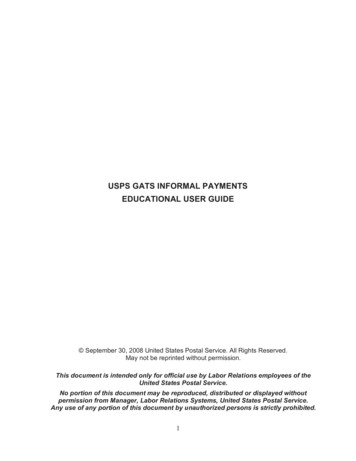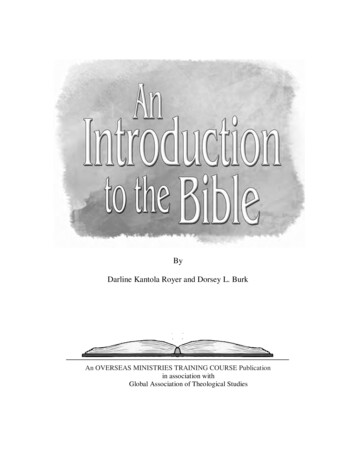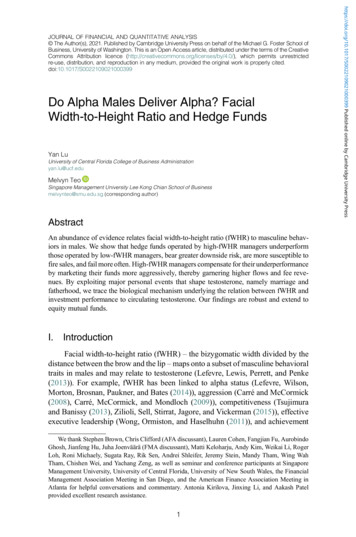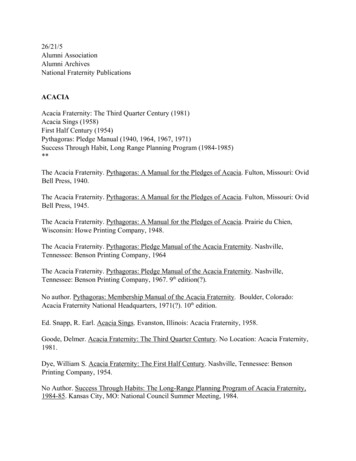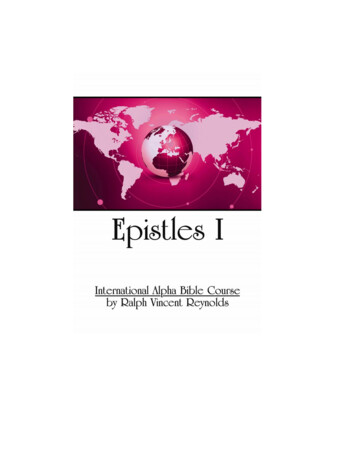
Transcription
Alpha Bible Course2
Epistles IEPISTLESPART ICONTENTSLesson OneLesson TwoLesson ThreeLesson FourLesson FiveLesson SixLesson SevenLesson EightLesson NineLesson TenTHE PAULINE EPISTLESPAUL’S LETTER TO THE ROMANS, PART IPAUL’S LETTER TO THE ROMANS, PART IIPAUL’S LETTER TO THE ROMANS, PART IIIPAUL’S LETTER TO THE ROMANS, PART IVPAUL’S FIRST CORINTHIAN LETTER, PART IPAUL’S FIRST CORINTHIAN LETTER, PART IIPAUL’S FIRST CORINTHIAN LETTER, PART IIIPAUL’S FIRST CORINTHIAN LETTER, PART IVPAUL’S SECOND CORINTHIAN LETTER,PART ILesson Eleven PAUL’S SECOND CORINTHIANS LETTER,PART IILesson Twelve PAUL’S SECOND CORINTHIANS LETTER,PART IIIINTERNATIONAL ALPHA BIBLE COURSERalph Vincent ReynoldsWriter3
Alpha Bible CourseCopyright 1985, 2009Foreign Missions Division8855 Dunn RoadHazelwood, Missouri 63042 USAAn OVERSEAS MINISTRIES PublicationRv 2009094
Epistles ILesson OneTHE PAULINE EPISTLESA. THE EPISTLESIn the New Testament there are twenty-one epistles, fourteen ofwhich were written by the apostle Paul.There is a definite harmony in the New Testament, and theEpistles should be studied after the student has a thorough knowledge of the Book of Acts. The writers of the Epistles, with the exception of Jude, were all leading characters in Acts. The message foundin the historical Book of Acts is mainly addressed to the unbelievers;the Epistles were written to believers. The purpose of the Book ofActs is to evangelize; the purpose of the Epistles is to instruct and toedify. The Book of Acts answers the question, “What must I do to besaved?” The Epistles answer the question, “What must I do to livefor Christ after I am saved?”Just as there is harmony between Acts and the Epistles, there isalso harmony among the Epistles themselves. The writers nevercontradicted one another although each author had his own distinctive theme:Paul’s theme in his epistles—FAITHPeter’s theme in his epistles—HOPEJohn’s theme in his epistles—LOVEJames’ theme in his epistle—ACTIONJude’s theme in his epistle—VIGILANCEThe word epistle comes from the Greek epistole and the Latinepistola. In modern English they are simply called “letters.” Thisword is used in the same way we would use letter in ordinary correspondence.Although a few of the Epistles were addressed to individuals,most of the Epistles were written to be read publicly to the churches.Some of the Epistles were written to meet specific needs of particular5
Alpha Bible Coursechurches and individuals. Nevertheless, they were so inspired andof such spiritual importance that they were of great interest andprofit to everyone. They were soon quoted as being part of theScriptures and found their place in the New Testament canon asinspired writings.B. APOSTLE PAULWe may readily understand the importance of the ministry ofapostle Paul when we remember that he was the central character inthe last sixteen chapters of the Book of Acts, and that he was theauthor of fourteen epistles which make up part of the New Testament. We may learn a great deal about this great man of God by notonly studying the historical sketch given in the Acts, but also bystudying his own writings. Each of his epistles tells us somethingabout the author.He was born Saul, the son of an important Jewish family withRoman citizenship. His birth place was Tarsus, the chief city ofCilicia and the seat of a well-known school of learning. He was of thetribe of Benjamin.As a youth he was sent to Jerusalem to continue his education.There he was taught by Gamaliel, one of the most distinguished rabbis of that day. Paul soon became a member of the Pharisee partyand an arch persecutor of the church. Considering the prominentplace he took at the death of Stephen and in the persecution of theChristians, it would seem that he was a member of the Council ofthe Sanhedrin.About AD 35, while traveling in order to arrest the Christians,Saul was converted when Jesus appeared to him on the road toDamascus. After spending some three years in the Arabian dessert,he eventually made his way back to Tarsus. There Saul remaineduntil Barnabas brought him to Antioch to be a teacher to the youngchurch. In Antioch he received his missionary call and was set forthby the assembly.It was during his second missionary journey, in late AD 50 orearly 51, that he wrote his first letters. These were his epistles to thechurch at Thessalonica.6
Epistles IC. PAUL’S LETTERSPaul was a great evangelist. The entire Mediterranean world wasstirred by this great soulwinner who traveled from town to town,declaring the apostolic truth without fear or favor.In the beginning of his ministry, he made return trips to thenewly established churches. In this manner he confirmed them inthe truth and corrected such errors that might have arisen. Thisbecame more and more difficult, however, as the number ofchurches grew, and his ministry was extended farther and fartherafield. It was then that he began to write letters of advice, encouragement, instruction, and correction to the elders and saints of thechurches he had established.Apparently, Paul had some difficulty with his eyesight andtherefore dictated most of his letters to a copyist. Then he wouldadd the salutation in his own “large hand.” When he wrote theGalatians, however, Paul departed from his usual custom and wrotethe entire letter with his own hand (Galatians 6:11).Paul wrote three of his letters to pastors of churches, one to aChristian friend, and the others to churches. The letter to the Galatians was to be circulated to the churches in Galatia.D. THE CHRONOLOGY OF PAUL’S LETTERSWe shall study Paul’s letters as they were recorded in the Bible.Nevertheless, it will help us a great deal if we would remember thechronological order of these letters. They were written as follows:1. About AD 50-53; written during Paul’s second missionaryjourney:I ThessaloniansII Thessalonians2. About AD 54-58; written during the third missionary journey:GalatiansI CorinthiansII CorinthiansRomans7
Alpha Bible Course3. About AD 61-63; written during Paul’s first imprisonment ws4. About AD 64-67; written after the release from the first andduring Paul’s second imprisonment at Rome:I TimothyTitusII Timothy8
Epistles ILesson TwoPAUL’S LETTER TO THE ROMANSPART IA. AUTHORThe epistle to the Romans was written by the apostle Paul. Inthe very first verse he identified and introduced himself to the Romans. He described himself as being a servant of Jesus Christ,called to be an apostle and separated unto the gospel of God.The term servant means “bond-servant.” The apostle Paul lookedupon himself as being a bond slave of Jesus Christ. In this lessonPaul actually stated the motto that directed his life: “As much as inme is, I am ready to preach the gospel” (verse 15). In this statementwe find the characteristic that directed Paul throughout his entireministry and the one thing that made Paul the great apostle that hewas.B. DATE, PLACE, AND CIRCUMSTANCES OF WRITING1. DateThe epistle to the Romans was written in AD 58. Apostle Paulhad been a Christian for about twenty years. This epistle was writtensome twenty-eight years after the resurrection of Jesus Christ.2. PlacePaul spent three months with the church at Corinth, from the lateautumn of AD 57 to the early spring of AD 58. It was during thesethree months that he wrote the letter to the Romans and sent it toRome by Phoebe, a deaconess of the church of Cenchrea, a suburband port of Corinth. Phoebe was an active Christian helper andwoman of quality and means. Paul entrusted to her this epistle,which was his most important letter.9
Alpha Bible Course3. Circumstances of WritingApostle Paul had long desired to visit Rome and to preach thegospel there. This epistle was written to pave the way for his arrivaland, in the meantime, to supply much needed teaching material.The epistle is the only letter written by Paul to a church which hehad not founded. His other letters were written to individuals or tochurches and were written to warn of danger or to correct somemistake and to encourage them in the Lord. These epistles werewritten to converts or to churches which had been founded by him;the epistle to the Romans was written in preparation for his comingministry.C. THE CHURCH AT ROMEPaul greeted the church at Rome as being beloved of God,called to be saints (verse 7). Undoubtedly, the assembly at Romeconsisted mainly of Gentiles. However, there were some Jewishbelievers. In 63 BC the Roman General Pompey established a Jewish colony at Rome. In his epistle, Paul addressed both Gentiles andJews.The names recorded in Romans 16 give an indication of themembership of this assembly. Among these there were Jewish,Roman, and Greek names. It would seem that Paul was personallyacquainted with many of these. When persecution came to Jerusalem and the Christians were scattered, they traveled throughout theRoman Empire. Undoubtedly, some found themselves at Rome. It iseven possible that a few were converts of Paul. Others were converts of Barnabas, Peter, or other evangelists.D. PAUL’S MASTERPIECEThis epistle is Paul’s most important work. It has been calledPaul’s masterpiece. If one wants to understand Paul’s theology, hemust carefully study the Epistle to the Romans.This epistle is the philosophy of the gospel, showing how itmeets every human need and is the only answer to the problem ofguilt and power of sin. There is no book in the Bible that looks sofearlessly into the depth of the degradation resulting from human sinand gives God’s answer for it. The Epistle to the Romans is a doctrinal treatise, a body of systematic theology. It is a fundamental,10
Epistles Iprofound, and systematic discussion of the whole plan of salvation.It is universal in its application. It considers man as man, and not asJew or Gentile. Whether Jew or Gentile, salvation is provided inJesus for all who will believe on Him and obey His gospel.E. THE THEME OF THE EPISTLEThe theme and text of the epistle is found in the introduction.The theme of Romans is justification by faith, the great doctrinestated in Habakkuk 2:4. This doctrine is developed in this epistleand may be summed up in six words: condemnation, justification,sanctification, adoption, restoration, and consecration.The theme of Romans is stated in the text of Romans:“For I am not ashamed of the gospel of Christ: for it is the powerof God unto salvation to every one that believeth; to the Jew first,and also to the Greek. For therein is the righteousness of Godrevealed from faith to faith: as it is written, The just shall live by faith”(Romans 1:16, 17).F. OUTLINE OF THE EPISTLEThe outline of the epistle which we shall follow in this study is hteousness Needed by Sinful Men—1:18-3:20Righteousness Provided by God—3:21-26Righteousness Received by Faith—3:27-4:25Righteousness Experienced in the Soul—5:1-8:17Righteousness Guaranteed a Permanent Blessing—8:18-39Righteousness Rejected by Jews—9-11Righteousness Manifested in Daily Life—12-16G. INTRODUCTION1. Salutation: 1: 1-7Apostle Paul greeted the Romans, stating his official positionand his reason for the writing the epistle.11
Alpha Bible Course2. Personal feeling: 1:8-15He expressed his deep interest in the Romans, his thanksgivingfor them and his desire to see them that he might impart some spiritual gift. He also stated his obligation to preach the gospel to all men.3. Theme: 1:16, 17After his salutation and expression of his personal feelings, Paulintroduced the theme of the epistle. He stated that he was notashamed of the gospel and was ready to preach the gospel even inRome. It is God’s power for the salvation of everyone, through faith,because it reveals God’s righteousness.H. THE POWER OF GODPaul stated that the gospel of Christ is the power of God untosalvation (Romans 1:16). In his epistle to the Corinthians he wrotethat our faith will stand in the power of God (I Corinthians 2:5). TheGreek dunamis, translated “power,” gives us our word dynamite(explosive power). The gospel is the dynamite of God. Moral reformand social schemes are impotent to penetrate human wickedness.The gospel overcomes the greatest resistance, penetrates thehardest conscience, and softens the most obstinate heart.12
Epistles ILesson ThreeEPISTLE TO THE ROMANSPART IIRomans 1:18-4:25A. RIGHTEOUSNESS NEEDED BY SINFUL MENScripture Reference: Romans 1:18-3:201. ExpositionRighteousness is the key to man’s relationship to God. Man isunrighteousness and as such cannot fellowship a God of infiniteholiness, whose throne is established on righteousness. Man isguilty and can do nothing to retrieve his condition. If God has norighteousness for him, man is finished.Man always pleads innocent. Before man can be brought to theknowledge of salvation, he must see himself completely guilty in thepresence of God. In this passage of Scripture, the apostle Paulclearly showed that man is guilty before God. Apart from the Lordthere is no one who is righteous. Paul dealt with this by showing fourclasses of guilty people.a. The Heathen (Romans 1:18-32)The heathen are without excuse. God is able to reveal Himself toman in any way He pleases. God can be known. In the past, Godrevealed Himself to man through creation. It is clear that the thingswhich God created testify to His invisible nature. The reason for thedarkness of this world is the rejection of light. The reason for theidolatrous systems of this world is the rejection of the knowledge ofGod. To reject God, to turn away from light, naturally brings darkness. Because men gave up God, He gave up them. Twice it isstated that God gave up them up—first to uncleanness and then to13
Alpha Bible Coursevile affections (verses 24, 26). Once it is said God gave them over toa reprobate mind.As the heathen turned from light to darkness and from the knowledge of God to idolatry, their downward steps should be noted. Images were made of man, birds, beasts, and reptiles and creepingthings. When people change the truth of God into a lie and worship andserve the creature rather than the creator, the whole order of nature isviolated and man slips downward into utter vileness and filthiness.The heathen described here had the opportunity to know therequirements of God. They knew that death was the penalty of evilaction. Yet they not only sinned with pleasure, but applauded otherswho were sinning.b. The Moralizer (Romans 2:1-16)Paul dealt with the respectable sinner, the self-righteous man,the man who excuses his own sins but condemns others. It was theworld of culture and refinement that Paul dealt with here. This type ofsinner feels that other men’s sins are worse than his own. Actually, heis a hypocrite. The sin of this man is that of being indignant at otherpeople’s sins while being indulgent of his own. The mistake that hemakes is a common one. He is measuring himself by others. Insteadof measuring themselves by someone else, they should measurethemselves by Christ. When they do this, all grounds for hypocrisyand self-excuse are swept away.Culture does not cleanse the heart. Education does not changethe nature of man. Recognition of evil is not necessarily power toovercome evil.c. The Jew (Romans 2:17-3:18)Paul showed that the Jews are also guilty before God. Jews, likeall men, refused to plead guilty. They plead religion as the basis oftheir action. Paul let them know that God refuted their claim toinnocence. Although they boasted of their religious privileges, theirunchanged lives rendered all of their claims void. Such actionbrought a greater condemnation upon them. Privilege increasedresponsibility; it did not set it to one side. Knowledge of the divineoracles gave the Jew a standard of judgment that no others had;therefore, he was inexcusable.14
Epistles Id. The World (Romans 3:9-20)After Paul had proven the case against both Gentile and Jew, heshowed that the whole world was guilty before God. He uncoveredthe universality of sin. All were unrighteous, and none were attempting to know God’s way to enable them to erase their guilt.Paul also showed the totality of sin. Speech, action and visionwere all contaminated because tongue, lips, mouth and eyes werebeing yielded as instruments of unrighteousness. The whole worldwas guilty; hence, the whole world needed a Savior. To deny theirguilt, to refute their need, would result in their rejecting their Savior,in whose name alone they could hope to find salvation. No fleshcould hope to be justified in the sight of a righteous God, for thewhole world was guilty before Him.2. Commentary—1:26, 27Here is stated the moral degradation that follows apostasy fromGod. Both homosexuality and lesbianism are mentioned. The increase of these sins and the terrible moral perversion of man todayare evidence of mankind’s apostasy from the truth of God (Romans2:5). This verse speaks of God’s anger which is stored up in heavenagainst the man whose heart is hard and impenitent. What a tragicstockpile a man can lay aside for himself (Romans 2:14)! “By nature” means “instinctively” (Romans 3:20).The law made man aware of sin in his nature and character.Man, by breaking the Law, understands that he is in need of salvation. Only through the broken law can there come the consciousness of sin.3. SummaryAll men are proven to be guilty before God. This is done by therevelation of the righteousness of God in the Law and by man breaking this law and revealing his own unrighteousness. It should benoted that this has always been the first step toward God: man seeing his own unrighteousness and need for God.15
Alpha Bible CourseB. RIGHTEOUSNESS PROVIDED BY GOD—3:21-26After Paul showed that sin was universal and God’s judgment isimpartial, he declared God’s gift of righteousness to be available toall. Man is wholly unable within himself to become righteous.The righteousness of which Paul wrote is not the righteousnessof man or the righteousness of the Law but the righteousness ofGod (verse 22). This righteousness of God is not a righteousnessachieved by the keeping of the Law; yet the Law and the prophetswitnessed to it.In this passage of Scripture we examine some of the great truthsof salvation: faith, grace, justification, redemption, and propitiation.Redemption means to buy a slave out of bondage in order to sethim free. Man, apart from God, is in a slavery from which he cannotfree himself. He is helplessly under the judgment of God, but GodHimself has intervened, paid the price and set him free. Propitiationis the putting away of God’s wrath. The wrath of God found adequate judicial satisfaction in the death of Jesus. Sin deserves punishment and death. There can be no reconciliation without judicialsatisfaction. Jesus suffered the just penalty for our sins upon Calvary’s cross that God might remain just and the One who can fullypardon the guilty sinner. Thus, the righteousness of God wasprovided by God for the guilty sinner.C. RIGHTEOUSNESS RECEIVED BY FAITH—3:27-31, 4:1-251. ExpositionPaul proved that righteousness must be by faith and faith alone, thatit might be by grace. If righteousness could be received by the works ofthe Law, it no longer would be by grace. If it came through works, thenman could boast of his goodness and of his accomplishments.In the distant past, the sin of Satan brought about the need ofsalvation being provided. What was this original sin? It was the sin ofpride. If pride and boasting could re-enter Heaven, then all that Godhad planned and accomplished in providing salvation would be invain. Boasting and pride must be excluded. Apostle Paul made it plainthat it is only if salvation is received by faith that boasting could beexcluded. If righteousness came through law or works, then therewould be boasting. If it is by faith alone, then all boasting is excluded.16
Epistles IRighteousness received by faith alone does not nullify the Law,but rather the Law is confirmed, or made valid. It is confirmed in itsrole of making men conscious of sin and confronting men withGod’s only plan for salvation.The fourth chapter of Romans proves that salvation is by faithalone. There may be many who believe that salvation is by faith. Butit must not only be by faith, it must be by faith alone.Two Old Testament characters were used to prove this greattruth. Abraham was one of the greatest saints of the Old Testament.If Abraham could not be saved by works, then nobody could. Davidwas one of the greatest sinners of the Old Testament. If David couldbe saved by faith, then everyone could. David had broken three ofthe Ten Commandments. He had coveted, committed adultery, andmurdered. What could David do to restore to Bathsheba her chastityand to Uriah his life? Nothing. His case was hopeless. David had tolook to the promise of God and, by simple faith, have righteousnessimputed to him.We also have proven here that salvation is not trusting in therites of religion. Abraham was a justified man fourteen years beforethe rite of circumcision was given. The rite had nothing to do with hisredemption. It did not confer righteousness; it merely confirmed therighteousness Abraham already had. Since the faith and bestowal ofrighteousness occurred before circumcision, Abraham was thefather of the Gentiles who believe. The fact that circumcision was asign of the righteousness imparted to Abraham because of faithmakes Abraham the father of Jews also. He is the father of thosewho walk in the faith that he had before he had any external sign.Finally, justification by faith alone is based upon the creativepower of God and the fact of the resurrection. Abraham knew thathe was physically incapable of fathering a child and that his wife,Sarah, was physically incapable of child-bearing. However, heweighed the human impossibility of becoming a father against thedivine impossibility of God breaking His Word and decided thatnothing is impossible with God.2. Commentarya. Romans 4:6-717
Alpha Bible CourseImpute simply means “to reckon, to credit.” When God imputesrighteousness to a man, God simply declares the man righteous,and righteousness is credited to him.b. Romans 4:20Stagger means “to be at odds with himself, to waver, to doubt.”With Abraham there was no uncertainty because of unbelief.c. Romans 4:25The fact of the resurrection of Jesus Christ validates the atonement.Because Jesus arose, the blood of Jesus Christ has power to cleansefrom sin. We are justified because of the resurrection of Jesus.3. SummaryBy faith, Abraham looked forward to the finished work of Christ.Jesus said to the Jews of His day, “Your father Abraham rejoiced tosee my day and he saw it and was glad” (John 8:56). We look back,by faith, to the finished work of Christ and enjoy salvation. Two waysare compared and contrasted: salvation by trying, and salvation bytrusting. What Abraham found, what David found, we must find.Salvation is by faith and by faith alone.18
Epistles ILesson FourPAUL’S LETTER TO THE ROMANSPART IIIRomans 5:1-8:39A. RIGHTEOUSNESS EXPERIENCED IN THE SOUL—5:1-8:171. Romans, Chapter Fivea. Results of Justification by FaithThere are definite benefits resulting from God’s act of justifyingus through faith. Paul stated that peace, joy, love and hope areincluded in these benefits.The first of these is peace. Having been declared righteous byfaith, the believer has peace with God. Peace simply means that thewar is over, the arms of rebellion have been laid down, and God’sterms have been accepted. This peace with God means cessation ofhostility between the soul and God. The hostility and animosity between God and believers are gone. In their place is blessed peace.We should note that there is a difference between peace withGod and the peace of God (Philippians 4:7). The peace of Godrefers to a sensation and tranquility of mind and heart. In Romans,peace with God is a complete surrender to the will of God. All hostility in the soul is gone. This brings about a fellowship with God.Through Jesus Christ we have access into the grace of God inwhich we have taken our stand. This grace is the unmerited favor ofGod. The believer stands justified.Having been justified and having access into the grace of God,the believer now rejoices in hope of the glory of God—not only inthe future hope but also in present trials. Trials, rather than destroying our faith, develop a proven character. These trials turn us awayfrom self-trust to complete trust in God. The believer glories in19
Alpha Bible Coursetribulations because tribulation brings about endurance, and endurance builds proven character. This brings about hope. The order issignificant: tribulation, endurance, character, and then hope. Thecharacter that is developed by tribulation and endurance gives thebeliever proof, or real evidence, that he is standing in the grace ofGod. The result is hope.b. The Love of GodWe shall not be disappointed in this hope, because we alreadyhave a foretaste of its consummation, which is the love of Godpoured forth within our hearts. This love which has been poured outand grips us is not our love for God but rather God’s love for us. Thenature of God’s love is best described by what it does. God lovesmen, sinful as they are. God’s love is totally unmotivated by anyqualities in the person loved. Apostle Paul described man as beinghelpless, ungodly sinners and even enemies. Men might evidencetheir love by giving their lives for a just man, but God showed Hislove by Christ dying for His enemies.c. The “Much More’s” of RomansIn this chapter apostle Paul made certain comparisons and usedthe expression “much more”: Verse 9, much more saved fromwrath; verse 10, much more saved by His life; verse 15, much moreGod’s grace hath abounded unto many; verse 17, much more thegift of righteousness shall reign in life by Jesus Christ; verse 20,much more grace abounds over sin. The student should take time tomeditate upon these much more’s, for they describe what JesusChrist accomplished for the soul that is justified.d. The Two HeadshipsThe whole matter of righteousness experienced by the humansoul is dealt with by a comparison of two representative headships:Adam and Christ. Our forefather, Adam, as the first representativeman, plunged the whole human family into sin and death, from whichman could not of himself escape. Through the last representative Manand His obedience to God, there came eternal life. This may besummed up as follows: Because of the sin and disobedience ofAdam, there came death and condemnation upon all mankind;because of righteousness and obedience upon the part of Jesus,20
Epistles Ithere came the free gift of justification, righteousness, abundantgrace, and eternal life to all who receive grace.The chapter ends with a statement dealing with the absolutesovereignty of God’s grace. God’s grace is absolutely sovereign.Eternal life through Jesus Christ is assured.2. Romans, Chapter Sixa. Our Death with ChristIf grace is more manifested as sin increases, why not go on sinning that the supply of grace might be increased? Paul’s answer:“God forbid!” Such a conclusion would be a direct contradiction.Death, once our enemy, is now actually made to minister to thebeliever through the benefits of Christ’s victory over the tomb.Paul would have everyone to know that our baptism into Christ’sbody is a baptism into His death and His resurrection. To obey thegospel one goes with Christ through the steps of regeneration. Thismeans that one dies to self and sin through thorough repentance, isburied with Christ in baptism into His death, and is resurrected to walkin newness of life. The life of our Lord is imparted through the baptismof the Holy Ghost. Should a person who has experienced such achange continue to sin? Not if the believer is dead with Christ. Acorpse is completely unresponsive to the promptings of sin.The grace of God in Christ Jesus is indeed freedom—freedomfrom sin, not freedom to sin.b. Two ReckoningsIn verse 11 we have the secret of a victorious life in Christ. Weare to reckon or count on certain things as true. Christ has sufferedfor my sins. I am therefore bought with a price; I am no longer myown. I am His; therefore, I do not recognize the old man which iscrucified with him. I count myself as being dead unto sin. However,this is only part of the story. The believer not only reckons himself tobe dead, but he also must see himself as alive unto God throughJesus Christ.21
Alpha Bible Coursec. Two YieldingsHaving reckoned ourselves dead to sin and alive unto God, wenow come to two yieldings. These are stated in verse 13: first, theinner life, and then the members. There is little use giving God someof our members when the heart is not yielded. The order should beto (1) yield yourselves unto God and (2) then your members asinstruments of righteousness unto God.d. Man’s ChoiceThere are two options available to man. He chooses either sin orGod as his master. Sin leads ultimately to eternal death; obedienceto God leads to eternal life. The real seat of sin is in the will. Sinreigns when the will says “yes” to temptation. The Holy Spirit reignswhen the will says “no.”The old sin-master pays the ultimate wages of death. Sin is adeceiver. It offers life and ends up paying death. On the other hand,the free gift of God offers eternal life in Jesus Christ our Lord.3. Romans, Chapter SevenIn the seventh chapter of Romans, Paul illustrated the deathstruggle of self. The carnal nature was condemned, for the Law madesin sinful. There was real defeat in the self-life. Some people try to livein the seventh chapter instead of accepting the fact that the self-lifemust die in order that eternal life may be imparted unto them. Why livein the seventh chapter, trying to justify sinfulness, when the Spirit willtake over the conflict and conquer the flesh. Through the life of Christ,one becomes strong. There is a clear contrast between the l
Alpha Bible Course 10 3. Circumstances of Writing Apostle Paul had long desired to visit Rome and to preach the gospel there. This epistle was written to pave the way for his arrival and, in the meantime, to supply much needed teaching material. The epistle is the only letter written by Paul to a church which he had not founded.
